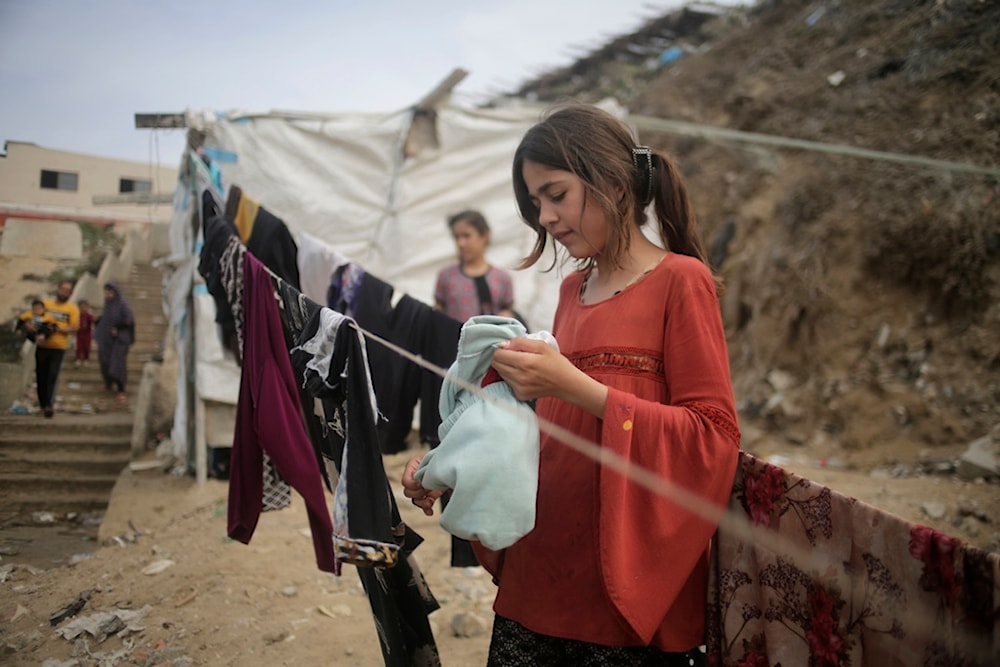Israeli aggression, siege puts Gaza at risk of a water crisis: WSJ
In light of water scarcity, many Gazans resort to consuming water contaminated by saltwater, chemicals, or sewage.
-

Palestinians resort to the seawater to bathe and clean their tools and clothes due to the continuing water shortage in the Gaza Strip, on the beach of Deir al-Balah, Central Gaza Strip, Sunday, Oct. 29, 2023 (AP)
A recent report published by The Wall Street Journal shows that the ongoing Israeli aggression on Gaza has brought the Strip to the brink of a devastating water crisis.
Clean water has become a critically scarce resource, severely affecting the lives of the locals.
According to the United Nations, water production (through desalination) in Gaza has plummeted to just 5% of pre-aggression levels, a shocking statistic that paints a grim picture of the Strip's current state.
The limited water that remains in Gaza is causing severe health issues among its residents, with both the United Nations and healthcare workers sounding the alarm.
The crisis is particularly dire in northern Gaza, which has been the primary focus of the Israeli aggression, The Wall Street Journal highlighted. Safe drinking water is no longer available in this area, as it is encircled by Israeli occupation troops, effectively cutting off the supply.
Desperate for water, many residents are left with no choice but to drink from whatever sources they can find, often turning to wells contaminated by saltwater, chemicals, and various other pollutants. These survival measures, driven by necessity, come with life-threatening consequences, particularly for the vulnerable, such as children. Gaza's healthcare system, already teetering on the edge of collapse, is ill-equipped to deal with the repercussions of this water crisis.
Before the start of the Israeli aggression, Gaza relied on three primary sources of water: desalination plants (which offered 7% of Gaza's water needs), pipelines from "Israel" (which offered 13% of Gaza's water needs), and numerous wells (which offered 80% of Gaza's water needs).
Read more: Israeli aggression killed 13,500, including 4,200 children
As part of its genocidal war on Gaza, "Israel" has disrupted all three of these sources. effectively cutting off water from the people of Gaza.
The limited humanitarian aid that does enter Gaza from the south, including bottled water, fails to reach the northern part of the Strip due to the siege struck against it by the Israeli occupation.
A small amount of drinking water, along with essential chlorine tablets for water purification, has made its way into Gaza through the Egyptian border delivered by trucks carrying humanitarian aid.
Additionally, Gaza's three desalination plants have sharply deteriorated in output due to the lack of fuel (the desalination water production is energy-intensive).
The dire situation has led to a shocking disparity in water availability. Residents of Gaza now have access to a mere three liters of water per person per day for all their daily needs, including drinking, cleaning, and other purposes.
In normal circumstances, daily personal water usage averages around 100 liters. Even in emergencies, the World Health Organization (WHO) recommends a minimum of 15 liters per day, underlining the extent of the crisis.
In addition to the shortage of water, the quality of the available water is also a concern. Groundwater extracted from wells is a mixture of freshwater and saltwater and often contains residual chemicals used in agriculture. With most wastewater treatment plants in Gaza no longer functional due to the aggression, sewage has become another potential source of contamination.
The Israeli aggression on Gaza has damaged at least seven water facilities across the Strip, including two large water reservoirs, according to the United Nations. Local authorities have issued warnings of an imminent risk of sewage overflow from non-operational treatment plants.
The consequences of this water crisis are already becoming evident, with people falling ill due to the cramped living conditions in homes, shelters, and hospitals, which facilitate the spread of diseases.
Read more: All bakeries in northern Gaza out of service as threat of famine looms
Yesterday, Israeli occupation Prime Minister Benjamin Netanyahu said that there will be no ceasefire, entry of workers from the Gaza Strip, or the passage of fuel into the area unless captives are released.
"I underscore that there will be no import of fuel, there will be no permission for workers to enter [from the Gaza Strip] and there will be no ceasefire without the release of hostages," Netanyahu said in a televised address.
Currently, in Gaza, electricity, clean water, and fuel have all run out, and there are no medical supplies or lifesaving treatments.
Read more: Israeli genocide continues in Gaza: 5 massacres in one day

 4 Min Read
4 Min Read








